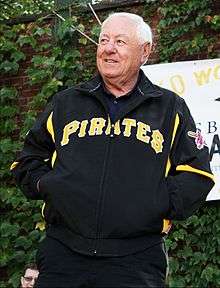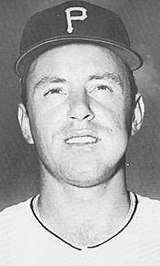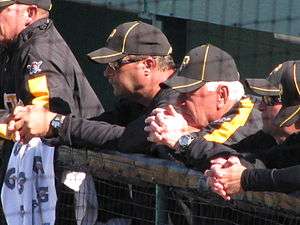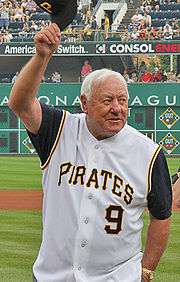Bill Mazeroski
William Stanley Mazeroski (born September 5, 1936) is an American former baseball second baseman who played 17 seasons in Major League Baseball (MLB) for the Pittsburgh Pirates from 1956–1972 and hit one of the epic home runs in major league history, a dramatic ninth-inning blast that decided the 1960 World Series and remains the only walk-off homer in a seventh game.[1] Nicknamed "Maz" and "The Glove," the latter because of unparalleled excellence in the field, he was inducted into the National Baseball Hall of Fame in 2001. Mazeroski took part in 10 All-Star Games [lower-alpha 1] and was a Gold Glove Award winner eight times.
| Bill Mazeroski | |||
|---|---|---|---|
 Mazeroski in 2010 | |||
| Second baseman | |||
| Born: September 5, 1936 Wheeling, West Virginia | |||
| |||
| MLB debut | |||
| July 7, 1956, for the Pittsburgh Pirates | |||
| Last MLB appearance | |||
| October 4, 1972, for the Pittsburgh Pirates | |||
| MLB statistics | |||
| Batting average | .260 | ||
| Hits | 2,016 | ||
| Home runs | 138 | ||
| Runs batted in | 853 | ||
| Teams | |||
| Career highlights and awards | |||
| |||
| Member of the National | |||
| Induction | 2001 | ||
| Election Method | Veterans Committee | ||
Mazeroski was a key member of two Pirates World Series championship teams in the 1960 and 1971 seasons. He and Roberto Clemente were the last remaining Pirate players from the 1960 World Series winners in 1971, when the Pirates won the World Series against the Baltimore Orioles in seven games. Mazeroski spent his entire playing career with the Pirates before he became ex-teammate Bill Virdon's third-base coach in the 1973 season, one year after his retirement as a player. He served in the same capacity with the Seattle Mariners in the 1979 and 1980 seasons.
Early years
Mazeroski was born in Wheeling, West Virginia of Polish descent and grew up a Cleveland Indians fan in Rush Run, Ohio. He attended Warren Consolidated High School in Tiltonsville, Ohio, excelling in baseball and basketball. He started on the varsity baseball team as a freshman.
As a 17-year-old in 1954, Mazeroski signed with the Pittsburgh Pirates. Originally a shortstop, he was moved to second base and made his major league debut on July 7, 1956, against the New York Giants at the Polo Grounds. In his first plate appearance, he singled off Johnny Antonelli for his first career hit.
Baseball career

As a rookie, Mazeroski struggled at the plate, which prompted manager Bobby Bragan to drop him to last in the batting order for 10 games late in the season. Mazeroski later conceded that the demotion had a negative effect on his confidence.
After Danny Murtaugh replaced Bragan at the helm in early August of the 1957 season, Mazeroski and the team showed immediate and steady improvement. One season later, the Pirates stunned the baseball world with a second-place finish, while Mazeroski blossomed into an All-Star for the first time in his career. His 19 home runs and 69 RB1 ranked second at his position in the major leagues. He also earned his first of eight Gold Glove Awards.
While his stellar defense regularly overshadowed his contributions with a bat — Pirates broadcaster Bob Prince often referred to him as simply "The Glove" — Mazeroski had several productive offensive seasons with one of the most potent attacks in the majors. In his prime years, he drove in more runs than any middle infielder in baseball even though he was frequently in the bottom third of the order. He had a career-high 82 RBI in 1966, when he batted no higher than the sixth spot in all except 17 games.
Mazeroski was a fly-ball hitter whose power numbers suffered in the vastness of Forbes Field, where most long balls were reduced to doubles or outs. Overall, he hit over twice as many home runs on the road than in his home park – 45 home runs at home versus 93 on the road. By comparison, Cubs second baseman Ryne Sandberg hit only 118 of his 282 career home runs away from the comfy confines of Wrigley Field.
Mazeroski also was known for extraordinary durability, especially given the physical demands of the position. In a span of 12 seasons (1957-68), he started 150 or more games seven times and at least 129 in every one. In 1966 and 1967, he was in the field for all except 32 of a possible 2,921 2/3 innings.
The home run of all home runs
Mazeroski forged his legacy in the 1960 World Series, when he slammed two game-winning home runs, the last on October 13 in Game 7 off New York Yankees pitcher Ralph Terry at Forbes Field in Pittsburgh. After the Yankees had rallied with two runs to tie the score at 9-9 in the top of the ninth inning, at precisely 3:36 p.m. local time, Mazeroski slammed Terry's second pitch over the left-center field wall just to the left of the 406-foot marker. The mammoth blast gave the Pirates their first World Series championship in 35 years and set off a wild celebration in Pittsburgh that lasted for days. "The home run took a while to sink in because all I could think of was, 'We beat the Yankees! We beat the Yankees!'" Mazeroski told reporters in the jubilant home team clubhouse afterward.
Fourteen-year-old schoolboy Andy Jerpe retrieved the ball amid the cherry trees in Schenley Park, which was adjacent to the ballpark. Mazeroski signed the ball for him in the clubhouse, but the keepsake was lost during a neighborhood game a short time later.[2][3]
In the fourth inning of Game 1, with Don Hoak on base, Mazeroski hit a two-run homer off Jim Coates that cleared the left-field scoreboard. It extended Pittsburgh's lead to 5–2 and proved to be the difference in a 6–4 victory. He hit .320 with team highs of five RBI, four runs scored and two home runs in the series.
Hall of Fame selection and other honors
 | |
| Bill Mazeroski's number 9 was retired by the Pittsburgh Pirates in 1987. |
Mazeroski was elected into the Baseball Hall of Fame in 2001. He waited 23 years to gain admittance, which prompted Newsweek columnist George Will to remark six years before his election, "The exclusion of Mazeroski from Cooperstown is a case of simple discrimination against defensive skills."
On induction day at Cooperstown, Mazeroski only made it as far into his prepared remarks as thanking the Veterans Committee voters for choosing a player based largely on defensive skills (a rarity) before getting so overcome with emotion that he had to stop. Apologizing to those who "had to come all the way up here to hear this crap," he then sat down to a long and loud standing ovation from the audience and his fellow Hall of Famers.
A portion of the brick center field wall from Forbes Field remains standing on the University of Pittsburgh campus in Pittsburgh's Oakland District as a memorial. Locally, the barrier is usually referred to as "Mazeroski's Wall." Although this is technically not the actual section of wall that Mazeroski's famous home run cleared, a nearby plaque in the sidewalk of Roberto Clemente Drive does mark the spot where the sudden-victory homer cleared the wall. A Little League Softball field dedicated to Mazeroski lies on the other side.

In 1979, Mazeroski was inducted into the National Polish-American Sports Hall of Fame.[4]
In 1987, Mazeroski ran for the Democratic nomination for County Commissioner in his home of Westmoreland County, Pennsylvania but his bid was unsuccessful.
In 1995, Harrison Central High school, located in Cadiz, Ohio had a field donated by Bill which would later be known as "Mazeroski Field"
In 2003, the Ohio Buckeye Local High School in Rayland (which had since absorbed Warren Consolidated) honored him by naming their new baseball field after him, placing a monument behind home plate in recognition.
In 2004, the Ohio Valley Athletic Conference saluted Mazeroski by electing him among the inaugural members of their Hall of Fame, alongside Boston Celtic great John Havlicek and former Olympic wrestler Bobby Douglas.
Mazeroski was recognized by Major League Baseball by being selected to throw out the first pitch of the Home Run Derby that preceded the 2006 All Star Game at Pittsburgh's PNC Park, receiving a long standing ovation. He also was picked to manage the National League during the All-Star Legends and Celebrity Softball Game during the All Star week celebrations there.
In September 2010, a statue of Mazeroski was unveiled outside PNC Park, depicting his famed celebration—running with both arms extended, ball cap in right hand—after his Game 7 walk-off home run to win the 1960 Series. Sports Illustrated ranked that home run eighth on its list of the 100 Greatest Moments in Sports History.[1]
Film cameo
Mazeroski was the focus of a staged game-ending triple play as part of a cameo appearance in the 1968 Hollywood hit film The Odd Couple. In the scene, Oscar Madison was distracted from witnessing the play by an annoying phone call from Felix Ungar (immediately after sarcastically predicting to fellow sportswriter Heywood Hale Broun that the Mets still had a chance to win if Mazeroski hit into a triple play). In reality, Mazeroski never suffered such an inglorious moment during his playing days, but according to the Society for American Baseball Research was part of triple plays in both 1966 and 1968 as a fielder.
According to an anecdote recorded at the Internet Movie Database web page on The Odd Couple, the scene was actually filmed just prior to the start of a regular game at Shea Stadium on June 27, 1967. Maz reported that he was given only 10 minutes to get it done:
- They had a guy out there pitching and he was throwing fastballs. I knew I had to hit a liner to the third baseman. It only took two takes. The first pitch, I hit a line drive that went just foul. The second one, I hit a one-hopper right to third. He caught it, stepped on third, threw to second, threw to first, a triple play. Now that took talent![5]
Jack Fisher was the pitcher for the Mets in that scene.
Life after baseball

Mazeroski serves as special infield instructor for the Pirates in spring training and is retired in Panama City, Florida. He was also in a commercial for FSN Pittsburgh featuring former Pirates first baseman Sean Casey.
His son Darren is a retired junior college baseball coach.
His son Dave is an atmospheric scientist and did not pursue a career in baseball.
He would have been the guest of honor at the first showing in 50 years of the previously-lost television footage of Game 7 of the 1960 World Series, but was unable to attend due to hospitalization.
Mazeroski hosts an annual golf tournament, The Bill Mazeroski Golf Tournament.
See also
- List of Gold Glove middle infield duos
- List of Major League Baseball career hits leaders
- List of Major League Baseball players who spent their entire career with one franchise
Notes
- MLB held two All-Star Games from 1959 through 1962
References
- The Ultimate Walk-Off. si.com archive, retrieved April 7, 2016.
- "Former Point Breeze teen still wonders about lost Mazeroski ball". Pittsburgh Tribune. September 19, 2010. Archived from the original on September 23, 2010. Retrieved September 21, 2010.
- Westcott, Rich (2001). Great home runs of the 20th century. Temple University Press. ISBN 1-56639-858-4.
- "Archived copy". Archived from the original on September 28, 2013. Retrieved 2013-09-28.CS1 maint: archived copy as title (link)
- IMDB The Odd Couple Trivia Page
External links
- Career statistics and player information from Baseball-Reference, or Fangraphs
- career highlights Baseball Library
- The Baseball Page
- Bill Mazeroski on IMDb
- The Sporting News' Baseball's 25 Greatest Moments: Maz
- Audio: Mazeroski's home run to win Game 7 of the 1960 World Series
- Video of the 1960 home run on YouTube
- Time article about the home run
- "'60 Series film found in Crosby's cellar". FoxSports.com. Associated Press. September 24, 2010. Archived from the original on September 27, 2010. Retrieved September 24, 2010.
| Preceded by Luis Aparicio |
Last hitter of the World Series (Home Run) 1960 |
Succeeded by Vada Pinson |